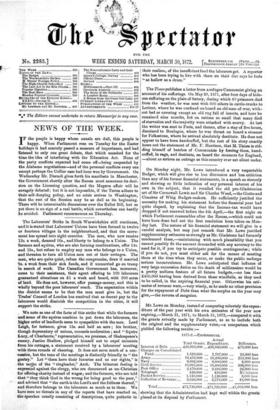On Monday night, Mr. Lowe introduced a very respectable Budget,
which will give rise to less discussion and less criticism than any of his former financial statements, in a speech so slovenly and showing so little indication of any personal interest of his own in the subject, that it recalled the old pre-Gladstonian art of Sir Cornewall Lewis and Sir Charles Wood,—the Giotto and Cimabue of Whig Budget-makers. He sufficiently justified the necessity for making his statement before the financial year had quite elapsed, by explaining that the Income-tax would have dropped if not renewed before the 4th April,—the first night on which Parliament reassembles after the Recess,—which could not have been done had not the first resolution been taken on Mon- day last. The nature of his financial statement we will give in a careful analysis, but may just remark that Mr. Lowe justified supplementary estimates as strongly as Mr. Gladstone had formerly condemned them,—maintaining with much plausibility that you cannot possibly fit the amount demanded with any accuracy to the need for it, if you try to anticipate possible contingencies; while if you do nut, you must either ask for the means of meeting them at the time when they occur, or make the public undergo serious inconvenience. Mr. Lowe anticipated that influxes of very large succession duties on the death of millionaires would be a pretty uniform feature of all future budgets,—no less than £450,000 having been derived from these windfalls, as they used to be called, in the expiring financial year. Otherwise his esti- mates of revenue were,—very wisely, as he made no other provision for the repayment of Debt than what the surplus on the year may give,—the reverse of sanguine.


































